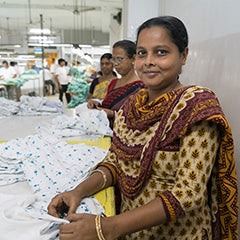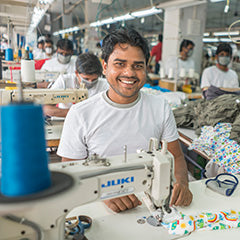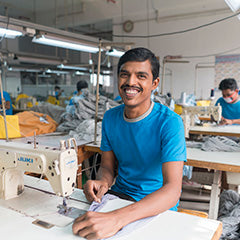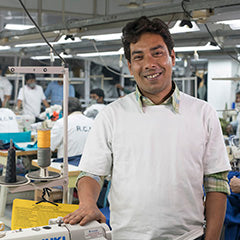

The Benefits of Organic Cotton
We love cotton for kid's clothes! And here's why, cotton is a strong, breathable, and natural material that can be made into many different fabrics and feels great next to the skin. But there's a catch. Pesticides used in conventional farming contaminate the soil, ground and surface water, and can also drift onto neighboring crops. The synthetic fertilizers commonly used result in water contamination and significant greenhouse gas emissions. These inputs have a significant negative impact on local communities and the surrounding ecosystem.
This is why using Certified Organic Cotton matters. Produced according to organic agricultural standards, it supports healthy soils, ecosystems, and people by banning the use of chemical pesticides, synthetic fertilizers and GMOs. By choosing organic cotton products, you're making a positive impact on the environment and the farmers who grow it. Compared to conventional farming, organic farming results in cleaner air, better soil, safer farming practices, and keeps toxins out of the finished product.
Not All Organic Cotton is Created Equal
Mightly sources cotton from Chetna Organic Farmers Association. Chetna was founded in 2004 and has grown from just 240 farmers to 15,000 small scale organic cotton farmers in the Orissa, Telangana, and Maharashtra regions of India. For nearly two decades, Chetna has supported marginalized farmers, enabling them to practice sustainable and profitable farming. Chetna farmers use 70% less water and 60% less energy than the average non-organic farmer. To learn more about Chetna’s inspiring story, click here.
Organic Farming is Just the Beginning
Cotton farming is just the first part of the multi-step manufacturing process and every step in that process matters! That’s where the Global Organic Textile Standard (GOTS) certification comes in. The standard was established by leading standard setters to define world-wide recognised requirements for organic textiles. From the harvesting of the raw materials, environmentally and socially responsible manufacturing to labeling, textiles certified to GOTS provide a credible assurance to the consumer and help generate positive impacts for both people and the environment.
Critically, GOTS covers all stages of organic textile processing. To carry the GOTS label, all steps must meet strict ecological and social criteria. One of the main focuses of GOTS is eliminating hazardous substances such as heavy metals, toxic chemicals, GMOs, formaldehyde, and solvents. Manufacturers are required to keep records of all chemicals used in production, and these substances must pass toxicity tests.
With the GOTS label, you can trust that organic cotton products meet world-wide recognized requirements for organic textiles from the farm to the finished product.

We believe that everyone deserves to thrive in a sustainable community and we believe that businesses have an obligation to the workers who make their products. In fact, our CEO and Mightly Co-founder, Tierra Forte was part of the team that developed and launched the Fair Trade Apparel and Home Goods Pilot Program back in 2009. The Fair Trade model protects human rights, supports livelihoods for farmers, fishers, and workers, and fosters resilience in both communities and supply chains. To date, over $1 billion in financial benefits have gone to producer communities around the world. Naturally this is a movement we want to be a part of!
Fair Trade is a global movement uniting producers, companies, consumers, advocates, and organizations. Together, we are working towards the mission of eliminating poverty and enabling sustainable development worldwide. Fair Trade Certified factories adhere to rigorous social, environmental, and economic standards to ensure worker health and safety. This includes safe working conditions, no child or forced labor, elimination of harmful chemicals, guaranteed maternity leave and other important provisions that benefit garment workers.
For every Fair Trade Certified product sold, Mightly pays an additional Fair Trade Premium to the workers who make our clothes. Collectively, they vote on how to spend the funds on projects that address community needs, so that their families can thrive for generations to come.
Since the launch in 2010, the Fair Trade Certified Factory Program facilitated sending $64M+ to over 230,000 factory workers. By increasing capital and decision-making mechanisms, the factory program enabled these workers to improve access to resources such as healthcare services, education programs, and groceries. For more information about Fair Trade visit Fair Trade USA and look for the label to support better working conditions for the people who make your clothes.
Rajlakshmi Cotton Mills
Mightly works with Rajlakshmi Cotton Mills. LLC in Kolkata India. In 2010, Rajlakshmi was the first factory in the world to achieve Fair Trade Certification under Fair Trade USA's new Fair Trade Standard for Apparel and Homes Goods. Rajlakshmi is a longstanding partner and supporter of Chetna Organic and buys 80% of Chenta’s organic cotton output. This partnership provides many additional benefits the Chetna farmers, including pre-harvest contracts, financing and support of community development projects in remote farming villages such as schools, vocational training centers, eco-centers, women's enterprises and revolving loan funds.

“By working at this factory, I’m able to support my family and meet daily needs. Every year when we receive our Fair Trade premiums, I’m able to put them into savings - which may become important later in life. I remember the first year when the factory joined Fair Trade, I was able to buy a bicycle for my son to ride to school - I was so proud! If the customers buy our products, we can benefit and improve our lives while also providing good clothing for people all over the world.”

“Since the Fair Trade program started here, the factory has improved overall and we have received different types of orders from abroad. I like that by working to make a good product, we are also able to help our families and each other. The past four years of premiums have really helped my family - one year, I was able to fix my roof; I’ve invested in savings which will double in 5 years. As my two daughters grow, they will need funds for furthering their education. I want to thank Fair Trade consumers for helping us improve our lives.”

Works in sewing at Rajlakshmi Cotton Mills.
“It felt good when the first premium arrived after we produced Fair Trade garments for a year. I never thought something like this was possible. I’m proud to have clothes I have worked on reach the US, England, Australia and all over the world. When people buy these products, it benefits us. We hope consumers will continue and invest in us. The impact of these premiums reach far beyond the factory - each worker has a home village and relatives that in small and big ways truly benefit. I personally left school after the 10th grade. My hope is to invest in my childrens’ futures so they can have a better future. Working here in a Fair Trade factory, I believe this is more possible.”

“My fellow workers recommended me to represent them in the FT committee. They thought I would listen to everyone and be fair. Different workers have different needs. Some want to buy computers, bicycles, home appliances. Some want to install toilets in their homes. I favor allowing a free hand rather than having the committee commit to putting workers’ premiums into savings or investments. One year, I used the premium money I received just before Bengali New Year to buy a bicycle for my daughter, then 13 years old. She would cycle 10 kilometers each way - the stretch of 1 railway stop - to get to a good school. I was happy to be able to improve our lives with my work. I think the Fair Trade program is wonderful and I enjoy working here because everyone feels more invested in their workplace. We work to a high standard and hope consumers will continue to support us.”